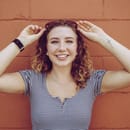I recently formally met my boss’s boss, Sarah Olcott. She mentioned she was in the Peace Corps and spent 2 years in Africa. I was instantly intrigued because I have a faraway dream of being a teacher or health specialist in Africa some day. Luckily, Sarah didn’t mind sharing her experience with me and my readers!
Her Campus (HC): What is your current profession and what do you have a degree in?
Sarah Olcott (SO): I have a Bachelor’s degree in English Creative Writing SUNY Geneseo and a Master’s degree in Higher Education Administration from the University at Buffalo.
HC: When did you decide to join the Peace Corps and how long were you involved?
SO: I decided to join Peace Corps during my junior year at college. I really wanted to see the world somehow, but knew I did not have the money to do it myself. There were many people from my college who did Peace Corps and there were recruiters regularly there. I served in Peace Corps as an English teacher from 1996-1998. After returning from service, I worked as a region recruiter for Peace Corps in New York from 1998- 2000.
HC: What was your role in the Peace Corps?
SO: I taught grades 11 and 12 English language. We used a British curriculum that reminded me a lot of foreign language class in junior high. Some of the students were very proficient in English and had been speaking it all their lives while others did not comprehend a word I said. I got really good at saying things multiple ways using different vocabulary until I was understood. It was difficult to know that some of the students had no idea what I was saying and just smiled! In Peace Corps you had to have an additional assignment. For my additional assignment, I chose more teaching. I taught in Namibia’s college for opening learning, which catered to adults whose education was disrupted by war or opportunity. The reason US Peace Corps and other countries’ volunteer organizations were in Namibia was that for many years, black Africans were not given access to school under the Apartheid regime. There were people from Australia, Scotland, Canada and Nigeria all in our school. When I arrived in 1996, Namibia had only freed itself from Apartheid rule since 1990. Namibia was a new country and people were given new opportunities.
HC: Can you explain some important/favorite moments you experienced while you were in Africa?
SO: There were some terrifying moments in Namibia that stick out at the moment. The most was when my house burned down. There was this device in the house called a geiser, which was a wall mounted, tankless hot water heater and it did not work. We did not have hot water in the house. We had a “handyman” come look at it on my birthday in February 1997. He lit it and it flamed up, but then went down again. He could not get it to work, so he abandoned the project. However, it was unaware to us that that flame had reached the roof and by the middle of the night, our whole house was on fire. I awoke because someone was throwing rocks at my windows; our windows were barred, so I thought, “well this is annoying.” However, they were also [people] yelling, “fire.” I got up to see my bathroom and kitchen in flames. I ran past the flames to my roommate’s room. Her name was Sally and she was from Australia. We both got out and ended up spending the night in a bucket line trying to put out the fire. I remember a San(tribe) man named Jesse who was shunned in town because of his ethnicity but was our friend. He valiantly ran in our kitchen—full of flames—to get out the propane tank before it blew up. There was a house right across the street from ours that had no roof because of that very thing. By morning, Sally and I were sitting on a mattress outside watching our house and belongings burn away and out of nowhere comes this baby pig—umbilical cord still intact. We named him Burnie, and he was a comfort to us through this time of need.
I have amazing memories as well, like the time I was preparing for class and I felt someone or something staring at me. I looked up from the mattress, and there was a donkey head in my window just staring at me. We got to travel around during our holidays from school, and I had the opportunity to see the Namib desert, Botswana’s Okavango Delta, and Zimbabwe. We traveled by hitchhiking, staying in tents, or with families who welcomed us into their homes. We met other Americans along the way: some in the Peace Corps and some living in Africa full-time. We met people from all over the world in our travels.
HC: How does this experience affect your lifestyle today?
SO: Living in post-Apartheid Namibia showed me a racism that I had never seen in the U.S. I saw a white Afrikaner get out of his car on the highway, grab a black African man, and beat him. I saw deep-rooted hatred, fear and segregation. When I confronted someone about this, he said that we Americans were just the same; we only hid our racism and were sneaky about our segregation. I brought this lesson home with me. When I got back to states, I saw our segregation and racism through a new set of eyes. I saw deep-rooted hatred and fear here as well. This pushed me to journey where I have lived my life trying to understand my own whiteness and the power and privilege that bestows. I have also been trying to give opportunities to students, encourage them to expand their horizons, and have opportunities that changes their lives and their thinking.
HC: Do you currently volunteer in other ways?
SO: Yes, I do. I am currently a brownie leader with the Girl Scouts. This is my fourth year doing that. I also give a lot of time to my church and organize kids programs, lead and teach VBS (vacation bible school), lead our Operation Shoebox efforts, and teach both youth group and Sunday school. My family also supports 3 children in Nicaragua through Compassion International. I strive to give my kids an understanding of the children from around the world and the state of poverty that most of them are in.
HC: What are your words of advice for those who want to join the Peace Corps? What about to those who want to work/volunteer in developing countries?
SO: Do it. It changes who you are and makes you a better human. In the US, we have so many first-world problems. But when you see life through the eyes of people just trying to survive, it changes you. Some people I encountered didn’t know when their next meal was or they would spend all day gathering and preparing food for their family. When these are your problems, life is harder, but simpler. I think we all need a reminder of what is truly important and how to help those that God has put in our lives.
It’s easy to see Sarah Olcott has many experiences, stories, and memories. I believe that God has placed her in my life for this purpose—to give me insight on the Peace Corps, along with maybe nudging someone along a similar path that they’ve been contemplating. I appreciate Sarah for being so open and reflecting on her past!


